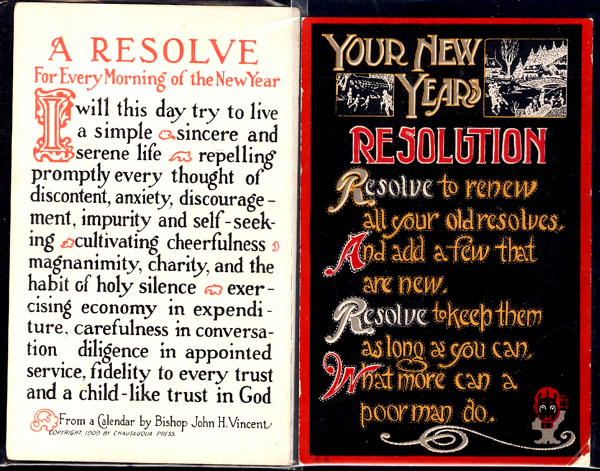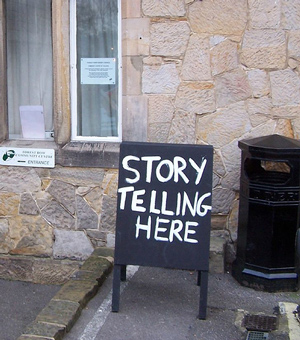Any good storyteller will tell you, above all else, to remain true to your subject. Your story may be imbued with a variety of plot contrivances, embellishments and anecdotal meanderings, but if you are true to your subject, the story will be worth telling.
We hear the same tired cliches time and time again, reminding us that "life is what you make it" and to "embrace the power of positive thinking." These are wonderful platitudes, but never quite seem to resonate in the way that they were meant to. Most people roll their eyes and continue on doing exactly what they've been doing.
That is, until New Year's.

New Year's resolutions postcard from 1915
Every year, the symbolic beginning of a new year encourages people to make changes in their lives. Why? What is so important about January 1st?

Pope Gregory XIII
We measure our time by the Gregorian calendar, so named after the Pope Gregory XIII who decreed it, rather arbitrarily, in 1582. This calendar system is a modification of the Julian calendar, which is derived from the Roman calendar, which may have its basis in the Hellenic calendar of ancient Greece. So, how is time measured using this calendar system?
The Gregorian solar calendar is an arithmetical calendar. It counts days as the basic unit of time, grouping them into years of 365 or 366 days; and repeats completely every 146,097 days, which fill 400 years, and which also happens to be 20,871 seven-day weeks. Of these 400 years, 303 (the "common years") have 365 days, and 97 (the leap years) have 366 days. This gives an average year length of exactly 365.2425 days, or 365 days, 5 hours, 49 minutes and 12 seconds.
365.2425 days in a year, a number reached by playing around with arithmetic based on lunar movement. Entirely arbitrary and rather arrogant, given how often mankind has been incorrect in its assumptions throughout history. Remember when the Earth was flat? Of course not. During your lifetime, you've been taught otherwise. Let alone the fact that the life of Jesus Christ is intertwined with the structure of the calendar. So when someone tells you that January 1st is approaching, there is an unspoken inference that you believe in Jesus as a prophet and lunar cycles as an accurate measurement of time. That is one hell of an assumption.

Magritte's "The Son Of Man"
So in any good story, there will always be a protagonist and a villain, with some kind of conflict. Man vs. man. Man vs. nature. Man vs. society. Man vs. the supernatural. Man vs. technology. But by far the most interesting (and least understood) is man vs. himself. It is here where the battle lines are not clearly drawn and the heroes and villains are not always well-defined and in direct opposition. Here, man must reconcile his desires and temptations, to arrive at some kind of peace with himself and his decisions. It is in this hidden struggle where the New Year's resolutions exist.
All of us have our insecurities and perceived weaknesses. We struggle with our health, our finances, our personal relationships. So each January 1st, many of us resolve to address these problems head on and with intense focus. The problem, of course, is that most New Year's resolutions fail. So what does that teach us about ourselves? That we are failures? That because of Jesus and lunar cycles and our lack of discipline, we are doomed to disappointment? Of course not. Each January 1st, we have another chance to start anew, to re-dedicate ourselves to self-improvement.
While there is some truth in "life is what you make of it," that phrase fails to capture the true magic of existence. It's not just that you have the ability to change the outcome of your life, it's that each of us is our own storyteller. We choose the story we want to tell the world. Some of us allow the world or other people to tell our story for us. Some of us are so distracted by modern life that we let the story go untold entirely while we are off pursuing our interests. Ultimately, though, the story is ours to tell. Through your speech, through your actions, you tell your story. You update your Facebook status and your MySpace profile and upload your photos to Flickr. You share (or don't share) your life with those around you. Some are left with the right impression, some are not. The story is still yours to tell.
Many people who I know personally choose to tell stories that betray their true identity. They show a smiling face to the world. They are popular, they are beautiful. They have been blessed with great wealth and opportunity. But often, there is a dark side to the story, a shame or regret or resentment, some intangible (but overwhelming) presence that is a large part of their story, but is never shared. Others seem happy to expose their demons and dark side for the world to see, afraid of somehow becoming too vulnerable if seen as anything less than human garbage. These are not likely stories that they would consider an accurate reflection of themselves, but they are being told nonetheless.
When you introduce others in your life, you will often say, "this is my friend Bill" or "this is my wife Sarah." In that short introduction, a story is being told. A label has been applied. The person receiving the introduction has had their perception colored by this information, a fact that will remain inextricably connected in their minds to your story. It conveys a message; "this is my friend Bill" implies that Bill is trustworthy and deserving of respect simply due to the nature of your friendship. "This is my wife Sarah" indicates that Sarah is sexually and emotionally unavailable; it sets a boundary and defines her existence in a very particular way. These are their stories, but not likely a sum of their existence. Bill may be a pedophile. Sarah may be cheating. We don't know these things - we only know the story that they (and those around them) choose to tell.

Hiding something?
Social groups often reinforce and re-tell these stories, with complete disregard for their veracity. Juicy gossip is something many of us relish, whether it's about a celebrity or a co-worker. We tell our own versions of someone's story to others. We criticize and devalue them in ways that are important to us. Perhaps it is jealousy, perhaps it is simply a mechanism of reinforcing one's own ego by making others appear to be lesser in comparison. One way or another, the end result is the same - a story is told about someone. As is often the case with gossip, these stories involve weight, looks, finances, job performance, family or relationship troubles - many of the same things we resolve to fix with our New Year's resolutions.
So why wait until January 1st? Why wait until an arbitrary lunar cycle happens to line up with an arbitrary calendar system developed by men who died nearly 5 centuries ago and centered around an arbitrary Christian theology? You can change your story any time you want to. That's the beauty of life. If you don't like the story you're telling, or the story being told about you, you can change it. If you want to lose weight, start the day you decide to. If you want to stop drinking or smoking, stop the day you decide to.

Tell your story.
It's your story, so tell the story you want people to know. If you are true to yourself, the story will be worth telling.